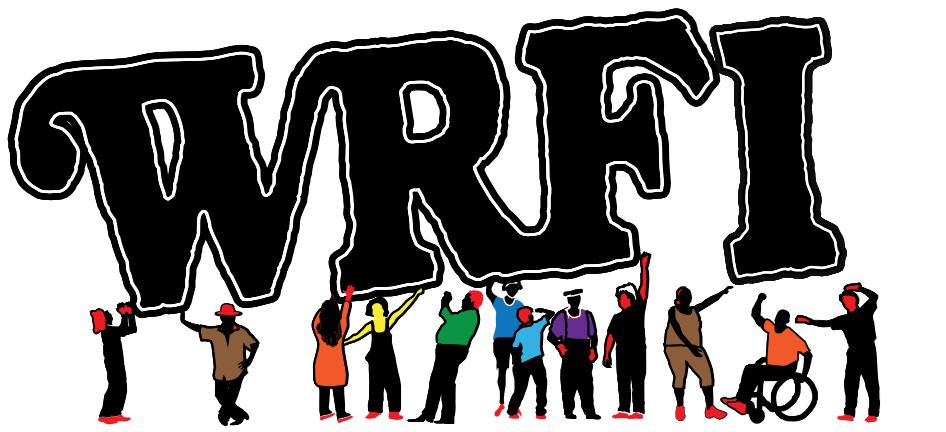Show Profile: BOMBAST

“BOMBAST” launched on November 21, 2012, and is a live, locally produced music program focusing on new, independent music. Every Wednesday at 9 p.m., Kid Catharsis takes over the WRFI controls, spinning electronic, reggae, independent rock, African, and experimental music. When first approached for this feature, Kid Catharsis told us, “My show is a precious, living butterfly, and I don’t like pinning it down for the purposes of explaining it. People should just listen to it.” Nevertheless, Jim Utz, who sits on WRFI’s Board of Directors and is also an acting Program Director, was able to corner Kid Catharsis and, after a few margaritas, answers emerged.
JIM UTZ: You frequently describe your show as a “trail mix.” What does that mean?
KID CATHARSIS: I wanted to do the sort of program that I would enjoy hearing on the radio – one that was about discovery and surprise, and which didn’t stay in the same territory for very long. I don’t want a consistent “soup” of limited-variety music, so that means playing songs and artists that wouldn’t normally fit under the same “genre” or “style” description. But I also want to avoid the cliche of a “long arc” or “narrative” in the song sequence, where the music has a “flow” or a “story” to it that is played out over two hours, and if you miss the 15 minutes of rock, let’s say, at the beginning of the program, you’re out of luck – you won’t hear that style again later in the show. So a listener can tune in for just about any chunk of time and hear what the show is about.
JIM UTZ: Doesn’t that provide a jarring experience for listeners?
KID CATHARSIS: Segues are important. I spend a lot of time on those. My ideal segue is one that takes the listener from one “type” of music to a totally different “type,” but which sounds seamless and inevitable. I would much rather hear the type of program that goes from Fela Kuti to Legendary Pink Dots than the type that goes from Fela to King Sunny Ade or something generic and predictable like that.
JIM UTZ: And people are happy with it?
KID CATHARSIS: I’ve only received one complaint in the nearly 50 programs that I’ve done, and that was from a gentleman who didn’t like the Pixies record I was playing and asked me what value there was in playing “heavy metal.” Other than that, people have been complimentary.
JIM UTZ: Other than Pixies, and a few other bands, I haven’t heard of many of the artists whose music you play.
KID CATHARSIS: But that’s a good thing, right? I get that a lot. People look at the playlists and say, “I don’t know who any of these people are.” But if you did, you probably would already have made a decision about whether you want to hear their music or not. If you want to hear it, you can either buy it or find it online easily enough, and if you don’t want to hear it, isn’t it a good thing that I’m not playing it? I listen to the radio to hear new and unfamiliar things, so in keeping with the idea that “Bombast” is the kind of show I would enjoy as a listener, that’s what I try to play.
JIM UTZ: And yet you also have this retrospective “Hall of Legends” thing that you do. What is that about?
KID CATHARSIS: Every now and then I devote an entire program to an artist or band that I think is possessed by genius but criminally underappreciated. Of course they have to have a large body of work, so generally it’s bands from the past, or people who have been working a long time. It’s not the Hall of Fame because the Hall of Fame already exists, and it’s “Legends” because the bands are legendary to me, but clearly not to many other people – yet!
JIM UTZ: You say that “Bombast” is about new music and music that you would want to hear, but what about features like “Physical Evidence” and “The Listening Parlour?”
KID CATHARSIS: The “Listening Parlour” gives my wife a chance to hack into the show. She gives me two or three songs that I have to play, whether I like it or not – I have no veto power over them, so I can only try to create segues around them. “Physical Evidence” involves bringing in a record or cd of music that isn’t on Spotify, iTunes, or whatever – you have to be able to hold it in your hand if you want to hear it. I think that’s important. I enjoy tangible objects, and records and cds are special things.
JIM UTZ: What about local music? Do you play any local artists?
KID CATHARSIS: Local in a galactic sense, yes. They are local to Earth. But in the sense that you mean–the great thing about “local” music is that it’s close at hand, and you can get out and witness it live, which is the best way to hear music and the best way to support local artists. The value of radio is that it can present you with music you can’t experience live. My show is a local show because I am a real person who lives locally. WRFI is about “voices in the community,” right? That’s me. That said, I do have plans to bring in some “local” bands that I really like for some live-in-studio appearances and guest DJ sets.
JIM UTZ: Is there any type of music you absolutely wouldn’t play?
KID CATHARSIS: Polka, Beijing Opera, and Billy Joel. I could probably be talked into Polka or Chinese opera.
